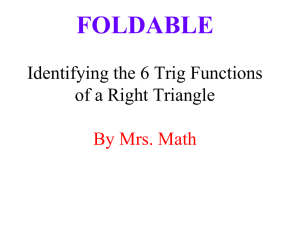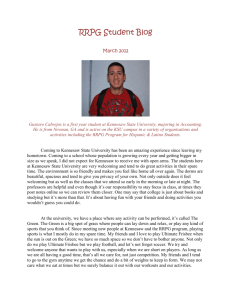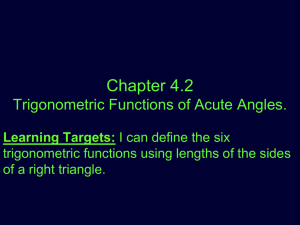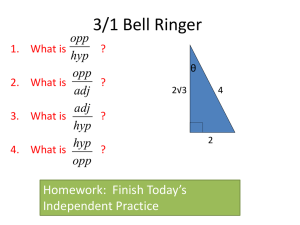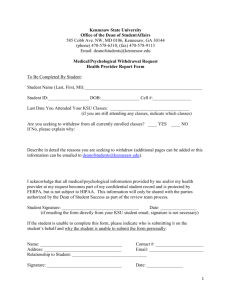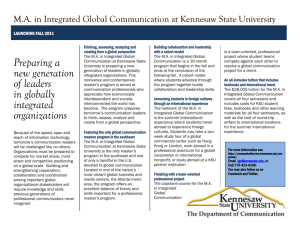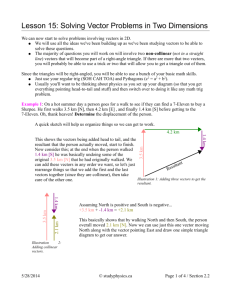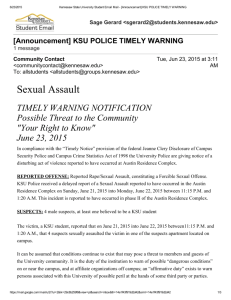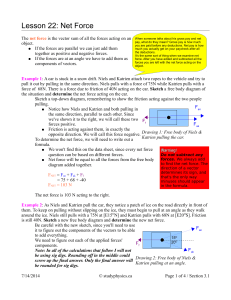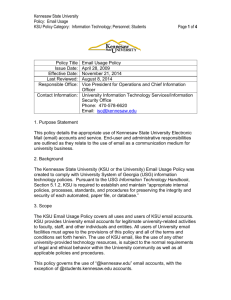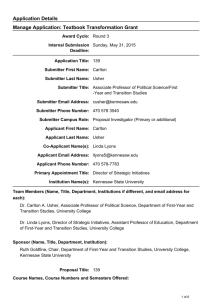PHYSICS 1111 - Kennesaw State University College of Science and
advertisement
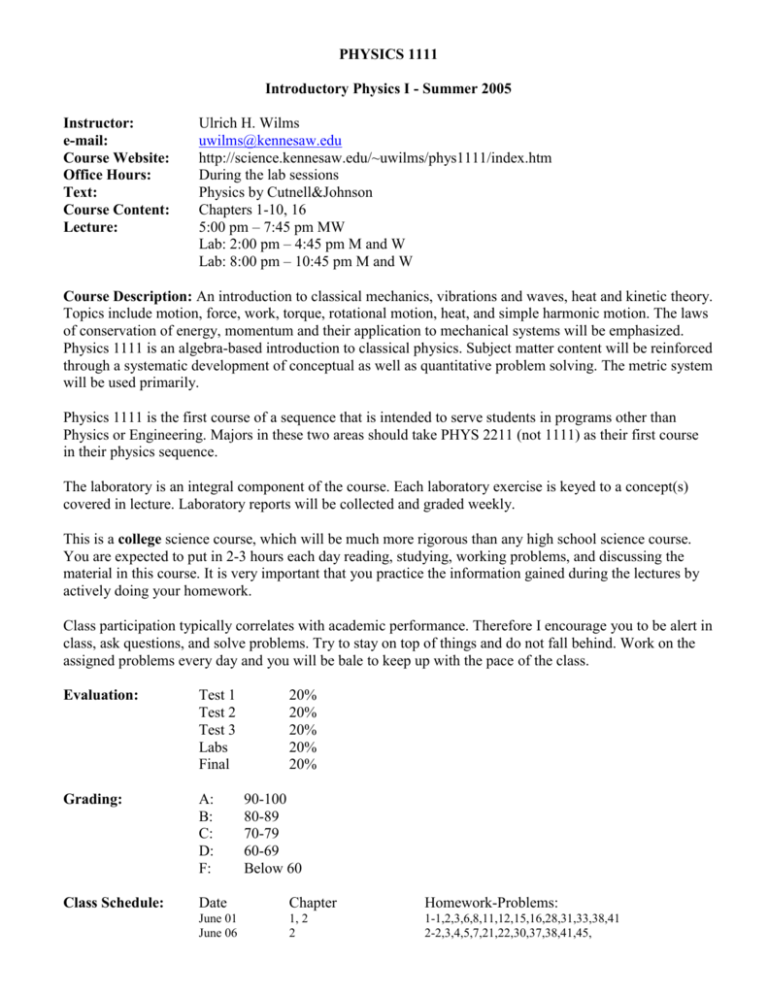
PHYSICS 1111 Introductory Physics I - Summer 2005 Instructor: e-mail: Course Website: Office Hours: Text: Course Content: Lecture: Ulrich H. Wilms uwilms@kennesaw.edu http://science.kennesaw.edu/~uwilms/phys1111/index.htm During the lab sessions Physics by Cutnell&Johnson Chapters 1-10, 16 5:00 pm – 7:45 pm MW Lab: 2:00 pm – 4:45 pm M and W Lab: 8:00 pm – 10:45 pm M and W Course Description: An introduction to classical mechanics, vibrations and waves, heat and kinetic theory. Topics include motion, force, work, torque, rotational motion, heat, and simple harmonic motion. The laws of conservation of energy, momentum and their application to mechanical systems will be emphasized. Physics 1111 is an algebra-based introduction to classical physics. Subject matter content will be reinforced through a systematic development of conceptual as well as quantitative problem solving. The metric system will be used primarily. Physics 1111 is the first course of a sequence that is intended to serve students in programs other than Physics or Engineering. Majors in these two areas should take PHYS 2211 (not 1111) as their first course in their physics sequence. The laboratory is an integral component of the course. Each laboratory exercise is keyed to a concept(s) covered in lecture. Laboratory reports will be collected and graded weekly. This is a college science course, which will be much more rigorous than any high school science course. You are expected to put in 2-3 hours each day reading, studying, working problems, and discussing the material in this course. It is very important that you practice the information gained during the lectures by actively doing your homework. Class participation typically correlates with academic performance. Therefore I encourage you to be alert in class, ask questions, and solve problems. Try to stay on top of things and do not fall behind. Work on the assigned problems every day and you will be bale to keep up with the pace of the class. Evaluation: Test 1 Test 2 Test 3 Labs Final 20% 20% 20% 20% 20% Grading: A: B: C: D: F: Class Schedule: Date Chapter Homework-Problems: June 01 June 06 1, 2 2 1-1,2,3,6,8,11,12,15,16,28,31,33,38,41 2-2,3,4,5,7,21,22,30,37,38,41,45, 90-100 80-89 70-79 60-69 Below 60 June 08 3 3-1,2,3,4,8,13,21,22,26,40,47,48 June 13 4 Test 1 4-1,2,3,7,10,11,13,18,19,20,34,35,40 June 15 4 4-46,47,50,57,63,64,65,67 June 20 5 5-1,2,3,7,11,12,13,15,20,27,28,36,37 June 22 6 Test 2 6-1,2,3,4,5,6,7,8 June 27 6 6-12,13,15,16,25,26,27,32,34,48,55,63 July 04 No class July 06 7 7-1,2,3,4,5,15,16,17,25,26,27 July 11 8 Test 3 8-1,2,3,4,5,7,16,17,19,20,29,32,33,38,39,41 July 13 9 9-1,2,3,4,5,11,12,13,17,18,31,33,43,52, July 18 10 10-1,2,3,4,5,6,14,15,17,24,25,39,40,46,52 July 20 10, 16 16-1,2,3,4,5,12,13,24,29,30,49,71 July 25 16 July 27 Final Exam from 5:00 pm – 7:00 pm The schedule is for reference only. Labs: Lab notebooks will be collected and graded usually once per week. All lab work must be performed while in the lab. Write legible. If you miss more than 2 labs, no credit for the course will be given (department policy). The first 30 minutes of each lab period are used to solve homework problems on the board. Make-up policy: Attendance is required for all test- and lab times. If you miss a test you will receive a grade of zero unless there is a valid excuse (illness, death). In case you miss a test due to illness or death I have to be informed latest on the day of the test (by email), otherwise you will receive a grade of zero for the test. A missed test must be made up during class following the missed test. Assignments are due at the stated deadlines. Assignments turned in late will 10% penalty per day that it is late. Without an appropriate excuse, a grade of F may be assigned for the missed work. Tests and Final: You must show all your work in order to receive full or partial credit for a problem. The final exam may be cumulative. Calculators without a “qwerty” board are allowed. Tests are approximately 1 hour long and will be conducted at the end of a period. There are no extra credit projects. Homework: The homework will not be taken up and graded. Attempt to solve all of the assigned homework problems. Test problems are often slight variations of homework problems if not the exact problem. You have to work lots of problems to succeed in this class. Academic Integrity: Every KSU student is responsible for upholding the provisions of the Student Code of Conduct, as published in the Undergraduate and Graduate Catalogs. Section II of the Student Code of Conduct addresses the University's policy on academic honesty, including provisions regarding plagiarism and cheating, unauthorized access to University materials, misrepresentation/falsification of University records or academic work, malicious removal, retention, or destruction of library materials, malicious/intentional misuse of computer facilities and/or services, and misuse of student identification cards. Incidents of alleged academic misconduct will be handled through the established procedures of the University Judiciary Program, which includes either an "informal" resolution by a faculty member, resulting in a grade adjustment, or a formal hearing procedure, which may subject a student to the Code of Conduct's minimal one semester suspension requirement. You are expected to follow the regulations as stated in the Kennesaw State University Undergraduate Catalog. Plagiarism and cheating of any kind will not be tolerated. This includes copying papers and not providing proper literature citations. Any violations of the Student Conduct Regulations will be handled through the University Court. Withdrawal Policy: The withdrawal policy as stated on page 40 of the 2004-2005 Kennesaw State University Undergraduate Catalog will be followed; see also the current schedule of classes. For the 8 week summer session, the last day to withdraw without academic penalty is 29 June 2005. Make certain to follow all procedures if you decide to withdraw; failure to do so will result in your being assigned a grade of "F" for the course. Please note, that while there is no academic penalty for withdrawing, there can be financial and other types of penalties. For example, a grade of "W" does count against hours attempted for Hope scholarship purposes. A pattern of withdrawing can hurt you in your attempt to get a job or into graduate/professional school. Do not make a habit out of withdrawing. Program Goals: The General Education Program at KSU has five goals. During the course of the program, students should achieve the following: develop productive habits of mind develop effective communication skills expand knowledge and understanding expand creative capabilities exhibit understanding of the impact of ethical and aesthetic values. Please note that all policies regarding student conduct found in the Student Code of Conduct will be enforced in the class. Formula Sheet Test 2: Kinematic Equations x x f x0 v v0 at t t f t 0 1 (v0 v f )t 2 1 x v0 t at 2 2 2 2 v v0 2ax v v f v0 x t v a t v x Trig. Functions (adj ) 2 (opp) 2 (hyp) 2 adj hyp cos opp hyp sin opp tan adj g = 9.80 m/s² 1 mile = 1609 m F ma F G W mg f smax s FN f k k FN m1 m2 r2 where G 6.673 10 11 N m 2 / kg 2
